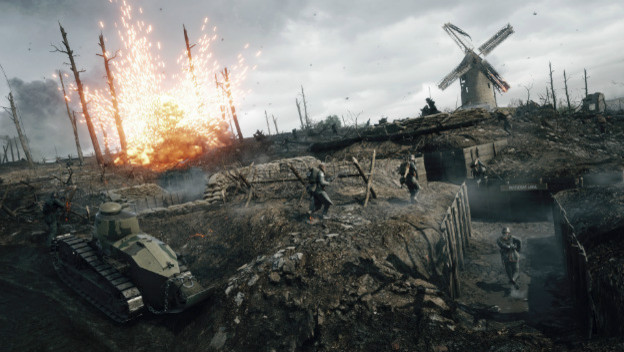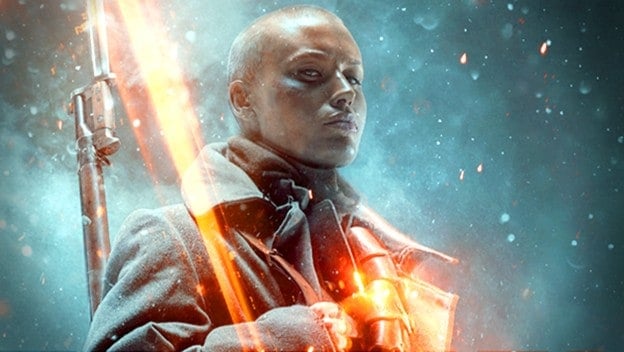AAA shooters that aren’t living in the Overwatch bubble have been struggling. 2016 was full of sci-fi shooters that seemed novel, but ultimately failed to maintain audiences or a reception beyond the usual, “eh it’s ok I guess, 8/10.” In 2017, we’ve seen several failed hero shooters and a bunch of games ruined by mediocre campaigns and/or loot boxes. But one game has managed to hit the sweet spot. It sold well initially, was well-received by critics, has solid online, a solid campaign, and no DLC controversies. It’s a home run in every sense of the world, with the only kerfuffles being real nitty-gritty balancing stuff, which is good too (it means the community is engaged). A year after its release, it still retains over a hundred thousand players on each console and a modest ten or so on Steam. I’m talking about Battlefield 1 .
I read an article on Kotaku recently about this, which is where those numbers came from. It talks about the game’s first year in a broad sense, going down a list of things that have happened so far within the game, outlining its DLC, and so on and so forth. I’m not going to go over that here of course, because that’s called plagiarism. Instead, let’s take a look at why this game has done so well along that content path. What’s so special about Battlefield 1 ? What made it stand out in the crowded month it released, what keeps it going strong now, and what kept it from sparking any major consumer-rage controversy? Let’s break it down.
First of all, DICE and EA hit the jackpot with the concept of Battlefield 1’ s campaign. Figuring out what to do with multi-player vs single-player content divide in big, AAA shooters has always been a problem, and the team knocked it out of the park on this one. It’s not even particularly well-written, or somehow revelatory. It’s a pretty straightforward look at World War I, which means lots of ugly violence. The key is that it’s served in chunks, each level telling a new story from a new perspective. The game cold opens with a segment based on the very real Harlem Hellfighters, the first African American regiment of the American Expeditionary Forces. It’s presented very seriously, even showing the name and death date of your character when you are inevitably killed. It doesn’t try Hollywood, although it does sometimes opt for a lighter tone in other levels. It’s a briskly-paced mix, peppered with real historical information provided by scholars. Meanwhile, games like Call of Duty: WWII and Star Wars: Battlefront II struggle to tell stories worth telling.
Next, Battlefield 1 has had a steady feed of DLC content for as long as it has been out. New weapons, maps, and even game modes have been added, and at a steady pace that has kept players coming back for more. It’s almost reminiscent of Nintendo’s strategy with Splatoon , but a bit more spread out and consistent. Maps have been dropping one at a time, giving each one time to breathe instead of dropping a bunch all at once, which has helped player engagement. The new modes have also managed to feel unique, including one that almost feels like a mix between capture the flag and football.
Finally, DICE has been consistently modifying the game’s balance in response to issues that have come up along the way. This has gone so far as to see DICE adding character class-like abilities to Battlefield 1 , despite the game not launching with such a feature. Changing what is arguable the core of the game halfway through its first year is a pretty brave move, but it seemed to have work. Additionally, a more hardcore competitive mode is being introduced, and entire maps are being rebuilt from scratch, along with many major modifications to how the different classes and abilities work, which will be separate from how they perform in the rest of the game.

What this comes down to is a level of commitment that, today, almost feels alien in the world of AAA games. DICE has been pouring its all into Battlefield 1 like few other games in EA’s current rotation. It’s strange how little props the game gets today, in light of all of EA’s unfortunate controversies. DICE itself is dealing with a ton of trouble thanks to Star Wars: Battlefront II , and it will be interesting to see how that ends up shaking out. The Battlefield 1 situation feels like a lot of moves made after Battlefield 4 was such a mess, and a lot of the good or interesting (if still flawed) bits of Battlefront II feel like reactions to the previous game’s criticisms as well.
Regardless, there’s no denying that Battlefield 1 is an excellent example of how to run a long-lasting, online shooter in AAA space. Keep the content coming at a steady pace, support the community at a high level, and try something new with the usual campaign structure. Game developers don’t set out to make lackluster experiences on purpose, of course, but Battlefield 1 should be elevated as a great example of what happens when things fall into place just right.
